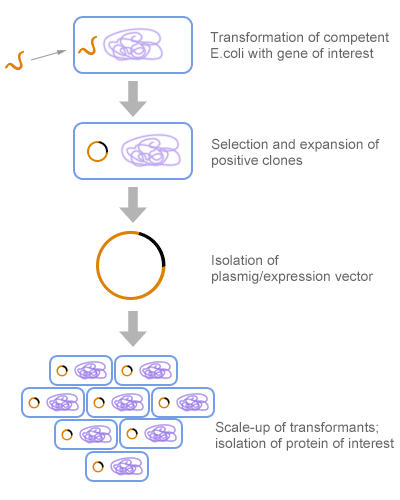Recombinant proteins
Recombinant proteins are proteins that are produced by genetically engineered organisms, typically using techniques of molecular biology. These proteins are generated by introducing the gene encoding the protein of interest into a host organism, such as bacteria, yeast, insect cells, or mammalian cells, which then serves as a factory for protein production.

Here's how the process typically works:
Gene Cloning
The gene encoding the protein of interest is isolated and cloned into a suitable expression vector. This vector contains regulatory elements such as promoters and enhancers that control the expression of the gene in the host organism.
Transformation or Transfection
The recombinant expression vector is introduced into the host organism through a process called transformation (for bacteria and yeast) or transfection (for mammalian cells and insect cells). This step delivers the vector into the host cell's genome or allows it to replicate independently, depending on the vector type.
Expression and Protein Production
Once inside the host cell, the recombinant gene is transcribed into mRNA and then translated into protein by the cellular machinery. The expressed protein may undergo post-translational modifications, such as folding, glycosylation, or phosphorylation, depending on the host organism used.
Purification
After protein expression, the recombinant protein is typically purified from the host cell lysate or culture supernatant. Various purification techniques, such as chromatography, affinity purification, or precipitation, are employed to isolate the protein from other cellular components.
Characterization
The purified recombinant protein undergoes characterization to confirm its identity, purity, and functionality. Techniques such as SDS-PAGE, Western blotting, mass spectrometry, and functional assays are commonly used for protein analysis.
Recombinant proteins have a wide range of applications in research, biotechnology, and medicine, including:
Biomedical Research
Recombinant proteins are used as research tools to study protein structure, function, and interactions. They are also employed in assays, such as enzyme-linked immunosorbent assays (ELISA), Western blotting, and protein-protein interaction studies.
Biopharmaceutical Production
Many therapeutic proteins, such as hormones, growth factors, antibodies, and enzymes, are produced as recombinant proteins for medical use. These proteins are used in the treatment of various diseases, including cancer, autoimmune disorders, and genetic diseases.
Vaccines
Recombinant proteins are used as antigens in the development of vaccines against infectious diseases. They stimulate the immune system to produce protective antibodies against specific pathogens, providing immunity to infection.

Overall, recombinant protein technology has revolutionized protein production, allowing the large-scale manufacture of proteins for research, diagnostics, and therapeutic applications.
There are no products listed under this category.
